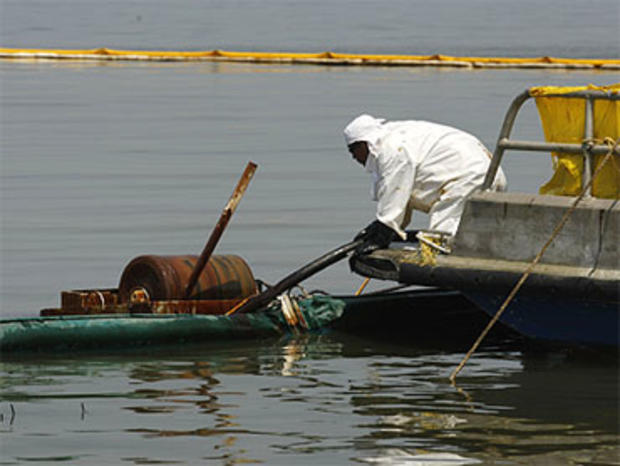Is Blame Shifting From BP to the Government?
At some point in the course of all tragedies, human or environmental or both, frustration turns to anger -- and anger turns to blame.
Blame is usually attached to the body most responsible for the problem. In the case of the oil spill in the Gulf of Mexico, it has been focused on the oil company responsible, BP.
But what happens when all that anger and blame isn't met with results? Blame is then shifted to another body that could potentially be held responsible. And in this case, that's the government.
Thus, today's CBS News poll: 45 percent of respondents disapprove of the Obama administration's handling of the gulf oil spill, while 70 percent disapprove of BP's handling of the situation.
As the oil keeps flowing, the White House has struggled to explain why despite the fact that it says it is doing all it can, that has not been enough. They are trying to say -- without actually saying it -- that there is a limit to what government can do.
At yesterday's White House briefing, incident commander Coast Guard Admiral Thad Allen said first and foremost it is BP's job to deal with the leak - and the government's job to work with the company to make sure the job is done right.
"BP or the private sector are the only ones that have the means to deal with that problem down there," he said. "It's not government equipment that's going to be used to do that. So there's got to be a way where private industry can address the problem with proper oversight by the federal government."
Allen was asked repeatedly about having the government push BP out of the way in order to take over.
"Well, to push BP out of the way would raise the question -- to replace them with what?" he asked. "I've been involved with the technical decisions made, especially in relation to deal with the leak, and they are pressing ahead. We are overseeing them. They're exhausting every technical means possible to deal with that leak."
For his part, White House Press Secretary Robert Gibbs said (as he did on Sunday's Face the Nation) that the federal government is doing all it can do.
"We are trying to do everything, as I've said, human and technologically possible, first to plug this leak, and secondly, to deal with what has spilled and both the environmental and economic impacts of that oil," said Gibbs.
In a White House which is battling growing public anger, there is plenty of frustration that the oil spill has yet to be stopped - and a belief there is not much more the government can do without BP and private sector's help.
"It is very difficult. It's 5,000 feet below the surface, and it's never been done before," Allen stressed.
The political peril for the White House is not yet known. The administration is working frantically to avoid the comparisons to Hurricane Katrina, which may be more geographic similarity than anything else: It's yet another tragedy in the Gulf of Mexico threatening Louisiana's well being.
Some Republicans are happy to cast blame on the Obama Administration and draw the Katrina comparison, which seriously hurt George Bush in his second term, and to point out that the White House continues to work on other issues besides the oil spill.
Today for instance, the president is proposing a new small business lending fund to help spur economic growth. Later today, he travels to California for fundraisers, including one for Senator Barbara Boxer, who is running for re-election. The fundraisers have raised the GOP's ire.
"Clearly the president's priorities have been grossly misplaced when he is more concerned about saving Barbara Boxer's career than with focusing his undivided attention on the massive Gulf Coast oil spill," National Republican Senatorial Committee (NRSC) spokeswoman Amber Marchand said in a statement.
In all tragedies, there is a lot for government to do, but the White House maintains that it can walk and chew gum at the same time - that is, focus on many things of importance at one.
But there are still many questions as to why the leak is not being stopped faster: Is BP doing enough? Why the government isn't tougher on the company? Why isn't the government doing more? How can this still be going on? How did this happen?
Sometimes, in a disaster of this magnitude, there are no answers. Just frustration.
Robert Hendin is a CBS News White House producer. You can read more of his posts in Hotsheet here.

